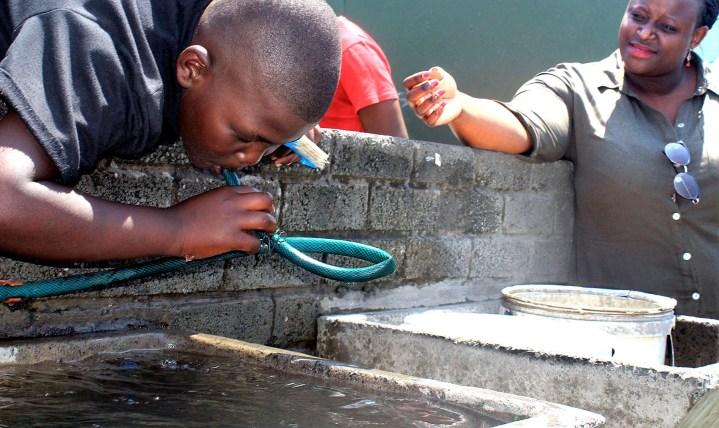DOWN THE DRAIN OP-ED
Full of holes — the leaky water bill won’t solve SA’s service delivery crisis

The National Water and Services Amendment Bill prioritises stricter regulations and fines, but what good are these when millions lack access to clean, running water? These amendments skirt around the core issue — systemic dysfunction in the water sector.
The right to access clean water, enshrined in Section 27(1)(b) of the South African Constitution, remains elusive to millions. In November 2023, the Department of Water and Sanitation (DWS) proposed the National Water and Services Amendment Bill.
The DWS argues that the bill’s changes will strengthen its role as a regulator and tackle the country’s socioeconomic challenges. However, while these goals are important, the bill primarily focuses on penalties, which may not be the most effective way to address the immediate need to get clean water to all South Africans.
The bill modifies two critical pieces of legislation governing water in the country: the National Water Act (Act 36 of 1998) (NWA) and the Water Services Act (Act 108 of 1997) (WSA). The NWA was enacted to ensure sustainable and equitable management of water resources, and the WSA focused on providing water access and sanitation. Both acts recognise the fundamental right to water (and sanitation), aiming to balance environmental protection with equitable access for all South Africans.
A recent webinar hosted by the University of Johannesburg’s Centre for Social Development in Africa (CSDA) and WaterCAN, a water justice organisation, explored the proposed water amendments in South Africa. I participated alongside John Dini, a Department of Water and Sanitation representative, and water activist Faeza Meyer, with Dr Ferrial Adam of WaterCAN facilitating the discussion.
The discussion centred on unpacking the implications of the amendments. Drawing from a 2021 report, Dini highlighted a concerning statistic: black people hold only 0.5% of water rights in South Africa, while white people hold a staggering 98.6%. Coloured and Indian communities hold 0.8% and 0.1%, respectively. Dini emphasised racialised inequality as the core issue that the changes were aimed at addressing: “That really is the problem statement for so much of what these amendments are trying to fix.”
South Africa is water-scarce partly due to its dry climate and semi-aridness. However, human activities like mining and farming make the problem much worse. The bill addresses this challenge by restricting mining, forestry and agriculture near “water towers” — areas crucial for water supply. “Water towers” cover 8% of the country, providing 50% of its water supply. This is a step in the right direction regarding protecting our meagre water resources.
Mining significantly threatens rivers, lakes, and groundwater through water pollution. Abandoned mines, exceeding 6,000, contribute to acidic water, requiring billions for clean-up. While the ban seems noble, a more nuanced approach, such as a strict application of the “polluter pays”, might be more effective. Unfortunately, enforcing the “polluter pays” principle has proven challenging in the past.
Laws in lieu of action
This history raises concerns about adding new regulations without addressing the underlying issues hindering effective enforcement. We risk creating a cycle of enacting new unenforced laws, leaving our precious water resources vulnerable and, worse, many people without water. Therefore, prioritising the full implementation and rigorous enforcement of existing regulations is crucial before pursuing further legislative changes.
The proposed bill introduces an “Apportionment of Liability” specifically for directors and municipal managers. They face potential criminal charges and financial penalties if their company or municipality violates environmental laws. However, the National Environmental Management Act (107 of 1998) (Nema) already holds company directors personally liable for failing to take “all reasonable steps” to prevent environmental violations.
While this inclusion aims to increase accountability, some legal experts argue it’s redundant and potentially conflicts with Nema’s existing provisions. They suggest scrapping this new clause or aligning it with Nema to avoid confusion and ensure consistent enforcement.
I agree with these concerns. Creating a separate system for directors and municipal managers complicates the legal landscape and raises questions about its effectiveness. Instead, strengthening the enforcement of existing Nema regulations would likely be more impactful.
A contentious quota system is proposed to ensure a more equitable distribution of water resources, address historical imbalances and promote responsible use. While existing licences consider 11 factors like past discrimination and socioeconomic impact, the amendments raise concerns about focusing solely on race.
Water allocation based on race raises concerns about discrimination against other groups and potential violation of equality guarantees in the Constitution. Furthermore, the established “all relevant factors” approach in the NWA might be challenged in the courts.
Environment vs household security
The proposed amendments focus on strengthening environmental regulations and tightening penalties, which are crucial in safeguarding our limited resources. However, the government needs to prioritise household water access and security. This omission raises severe concerns about the government’s commitment to address systemic corruption within the water sector, leaving millions vulnerable.
The Auditor-General’s reports consistently show poor financial management in most municipalities (except for the Western Cape), highlighting a potential link between poor financial practices and weak service delivery. AG reports from financial years 2017-2018 through 2021-2022 indicate that an average of 11.4% of municipalities got clean audits. The worst consistent performers were Free State and North West — provinces with poor water service provision.
Looking at the 2022 General Household Survey results, water access in the country presents a mixed picture. While national access has improved, there has been uneven progress across provinces. Access rose to 88.5% (mainly in Eastern Cape and KwaZulu-Natal), and six provinces, including Limpopo, Mpumalanga, and Free State, saw declines. Piped water access also increased marginally, adding 5.6 million households since 2004.
Over a third of households faced unreliable water supply, with residents in Northern Cape, North West, Mpumalanga, and Limpopo experiencing the most frequent and prolonged disruptions. In contrast, Western Cape and Gauteng enjoyed significantly better service, highlighting a significant geographical divide. This data underscores the concern about water insecurity in certain regions, urging immediate action to bridge the gap and guarantee equal access for all citizens.
Read more in Daily Maverick: Why Johannesburg’s taps keep running dry — An expert explains
The latest Blue and No Drop Reports indicate that there has been a decline in drinking water quality and an increase in non-revenue water since the last reports were issued in 2014. Meanwhile, the Green Drop Progress Assessment Report indicates a deterioration in the performance of municipal wastewater treatment systems. The water situation is a “crisis”.
While the bill focuses on redressing water inequality and coloniality in the water sector, it must not come at the expense of basic human rights. The bill prioritises stricter regulations and fines, but what good are these when millions lack access to clean, running water? These amendments skirt around the core issue — systemic dysfunction in the water sector.
The potential impacts of the bill remain unclear, and inconsistencies within the proposed amendments must be addressed before it becomes law. True progress demands a comprehensive approach that goes beyond legislative changes.
We must prioritise household water security by tackling systemic corruption, ensuring transparent governance, and investing in critical infrastructure upgrades.
Only then can we guarantee access to safe, reliable water for all South Africans. DM
Dr Anthony Kaziboni is Senior Researcher at the Centre for Social Development in Africa (CSDA) at the University of Johannesburg.



















 Become an Insider
Become an Insider
Comments - Please login in order to comment.